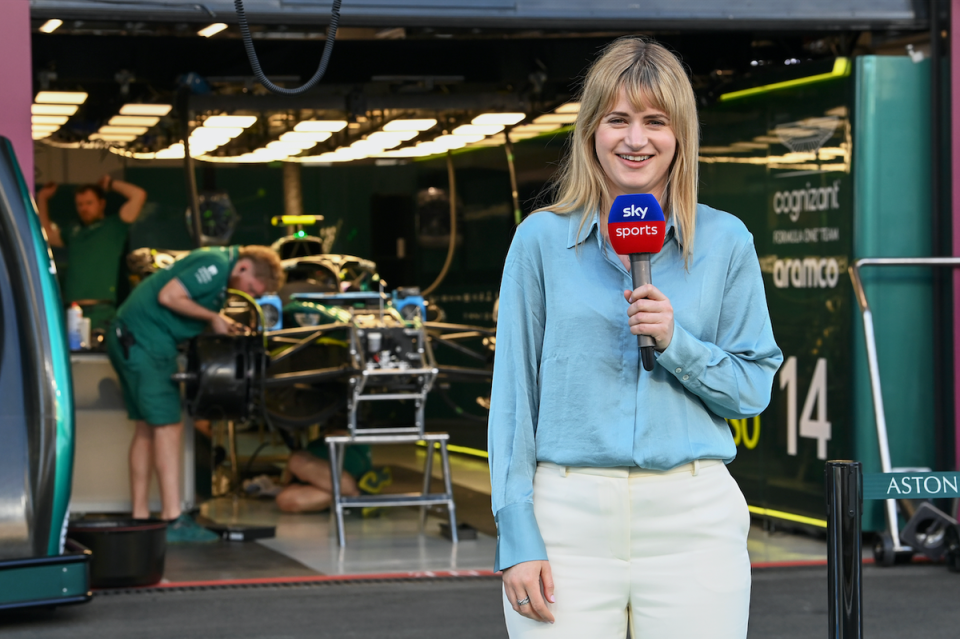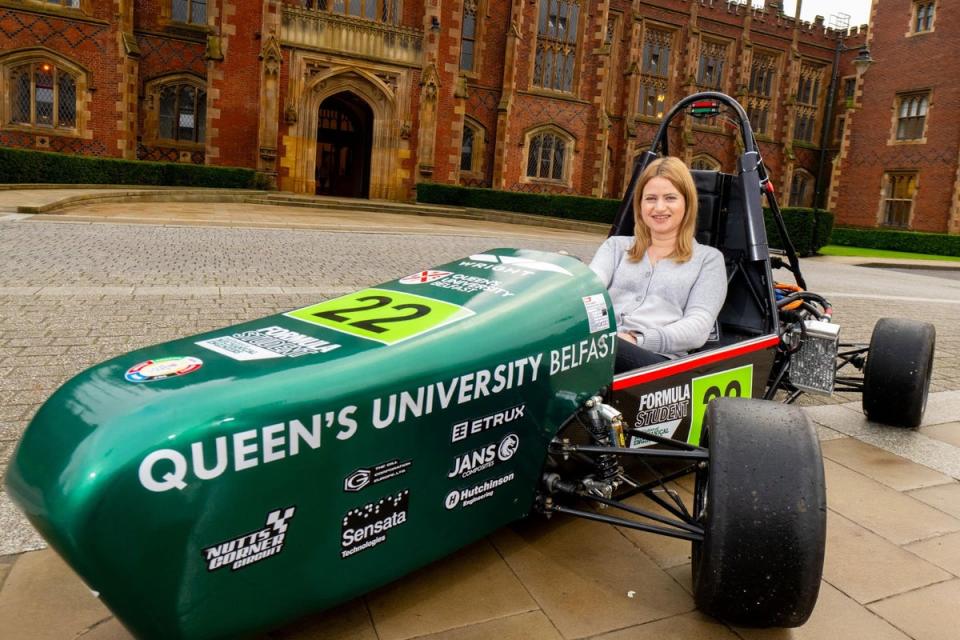Bernie Collins: ‘I don’t just represent women in F1 – but engineers too’

From university in Belfast and the circus of the Formula 1 paddock to the television screen and the world of the media, Bernie Collins’s path to her current role has been unorthodox to say the least. And in some respects, groundbreaking. Regularly the sole woman in a man’s world, the Northern Irish F1 expert has consistently broken the mould, first as an engineer for McLaren and a strategist for Aston Martin to now: a key cog in Sky Sports’ coverage of F1.
This weekend, Collins will be in the Osterley-based studio as part of Sky’s coverage of the Japanese Grand Prix. As she acknowledges, she is a rare breed of pundit: that is, someone from a data-driven background. And in a sport as technical as Formula 1 – perhaps the most statistical-based sport in the British mainstream – her unique perspective has positively tapped into a market previously untouched.
“It’s a story which hasn’t been sold,” says Collins, 38, of her role with Sky. “Even now when I watch other sports, football for example, most pundits are ex-footballers or managers. But teams have a data team and fitness coaches. I think it’s beginning to open up this realisation that all sports have technical areas and people are more interested in the technical side of sports than ever before.
“In my view, the more sports that can live off technical knowledge, the better.”
Whether it be in the commentary box explaining the different tyre options for teams during practice or the complications at play for strategists on raceday, Collins’s life now is a far cry from her upbringing in the small village of Maguiresbridge, which has a population of just 1,000, just north of the Irish border.
After leaving an all-girls catholic school in Mount Lourdes Grammar, Collins enrolled in mechanical engineering at Queen’s University Belfast. She was one of three girls in a class of 30 yet remained undeterred, particularly as she undertook the Formula Student programme, which allows students to design and construct small-scale racing cars.
“It’s hard to separate hindsight from what you felt at the time,” she says. “To go from an all-girls school to engineering at university must have been this massive change, but I never really found that.
“I just cracked on with what I was doing. There was never anyone at home who said ‘engineering is just a guys thing.’”
Quickly progressing through the ranks after securing a place on McLaren’s graduate training programme, Collins was promoted to the role of performance engineer in 2012. Three years later, she left to join Force India – now Aston Martin – as a performance and strategy engineer. She was head of race strategy by the time she left in 2022, having experienced enormous highs such as Sergio Perez’s win in Bahrain in 2020 and the Mexican’s 2016 podium in Monaco.
"Going back to my school is going to be interesting because I've literally not been there since I left" 🏫
Watch an EXTENDED version of Bernie Collins' trip back to Northern Ireland on Sky Sports F1 today at 11am ⏰ pic.twitter.com/uHyRDJtPz0— Sky Sports F1 (@SkySportsF1) March 17, 2024
Despite her rapid ascent, Collins was not exempt from cases of casual sexism in a workspace dominated by men. A topic of conversation firmly in the spotlight right now, given the ongoing saga involving Christian Horner and his suspended female colleague at Red Bull.
“I got on very well with all the guys I worked with, but there were examples,” she says. “At McLaren, I was doing drawings and a manufacturer rang up. I picked up the phone and they said ‘oh a girl, I’m looking for a B Collins’ and I said ‘yep, that’s still me.’ They just weren’t expecting a girl on the phone.
“You get a lot of banter but generally that comes from a pretty good place. F1 and motorsport is at times a very aggressive environment because people are tired, grumpy and passionate. But there was no free pass because I was a girl and equally I wasn’t pushed any harder.
“There was one guy in particular who used to be quite aggressive at times and I remember speaking to my other half about it and he said ‘he’s aggressive with everyone, he’s not treating you any differently.’ It was a fair point.
“Maybe this is just my character, but it’s only when people start asking questions about being a female in motorsport that I realise about being under-represented. Most of the difficulties I faced in my career were self-imposed. Like the guys got over mistakes and errors pretty quickly, but I remembered them. If they were at the bar having a drink, I’d still be thinking about it. They are just characteristics in me that I had to learn to manage.”

With F1’s surge in popularity came an increase in the sport’s zigzagging calendar around the world. Now, the schedule is at a record 24 races; a number which is “too extreme” in Collins’s view and is the primary reason she handed in her notice at the end of 2021.
But, working on 10 races out of 24 this year, she has found a new lease of life in front of the camera and behind the microphone since her first appearance on Sky last season. A career, she acknowledges, she found by “accident”, after impressing on the broadcaster’s old Any Driven Monday podcast. She has performed MC duties too, most recently at the Autosport International motorsport show in Birmingham in January. A matter of weeks earlier, she received an honorary doctorate from her old university – a full circle moment.
And, with it all, has come a newfound notoriety.
“The problem now is way more people ask questions online then I can answer!” she says, sincere and modest. “It’s good to show parents of young girls that you can make a good career out of engineering. People like an Irish accent too! It’s been an eye-opening insight into what the media do, how they get their data and sell it to the world. And I’m more up to speed on the gossip!
“But what I find most interesting is the amount of male engineers who are very complimentary about me. It’s been really positive and they’ve enjoyed engineering being represented in a better light. So I’m not just representing females in Formula 1, but also engineers who haven’t had a voice before.”

